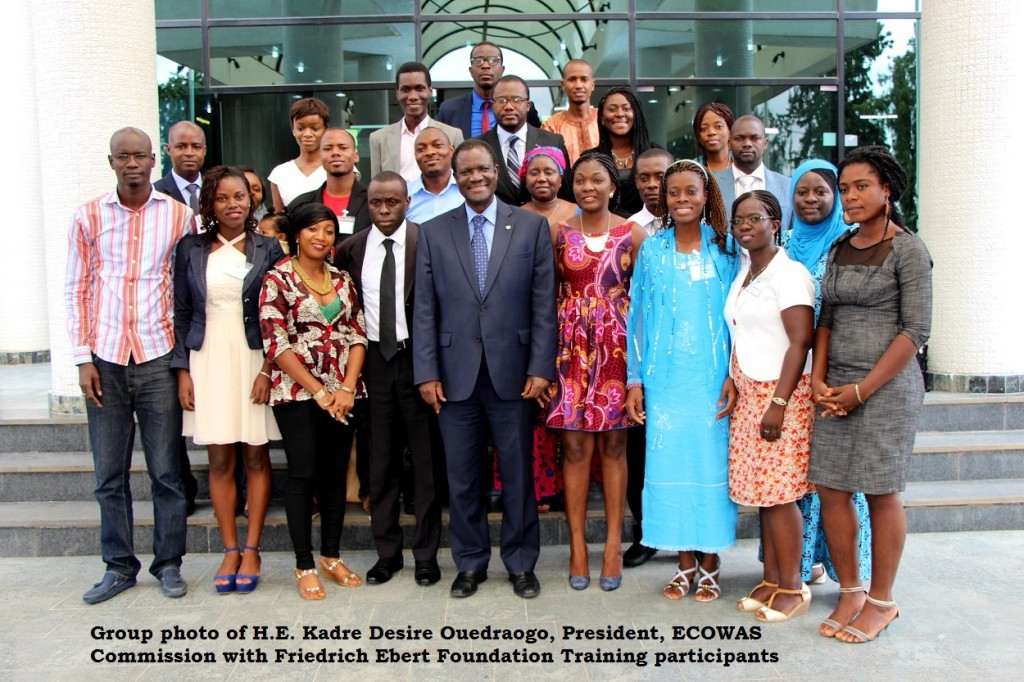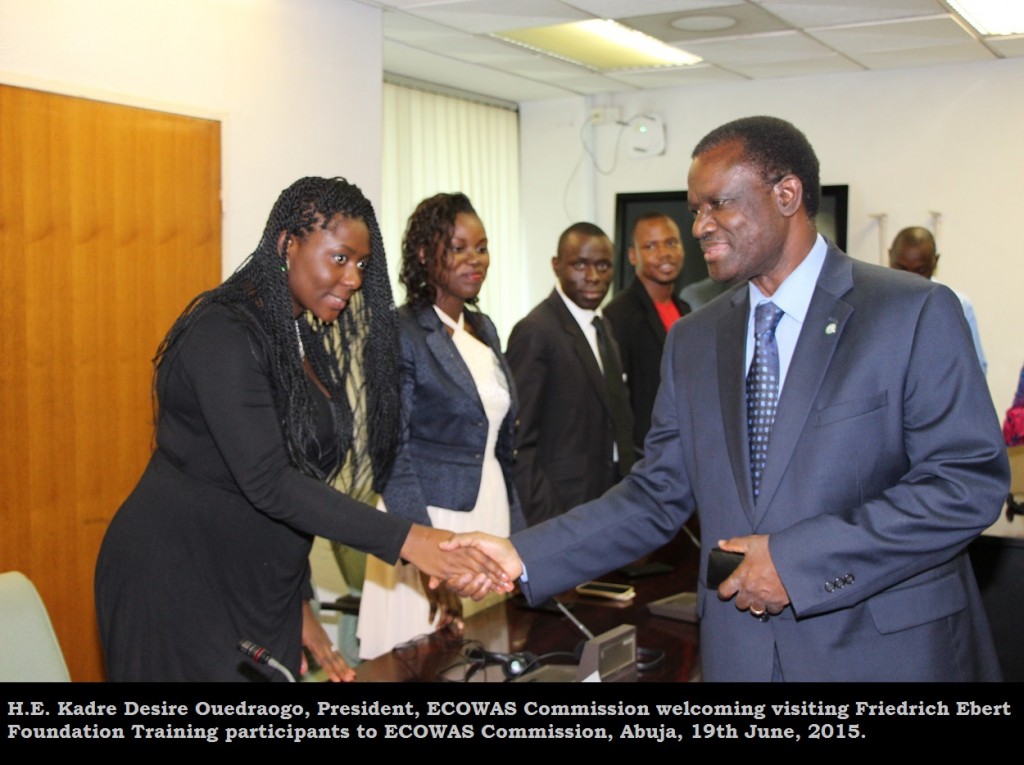|
 A delegation of about twenty West African youth leaders from nine ECOWAS Member States and Cameroon discussed integration issues with the ECOWAS Chief, Kadré Désiré Ouédraogo, at the Commission’s headquarters in Abuja, Nigeria on 19 June 2015. A delegation of about twenty West African youth leaders from nine ECOWAS Member States and Cameroon discussed integration issues with the ECOWAS Chief, Kadré Désiré Ouédraogo, at the Commission’s headquarters in Abuja, Nigeria on 19 June 2015.
The youth leaders from Benin, Burkina Faso, Côte d’Ivoire, Ghana, Liberia, Mali, Nigeria, Senegal, Togo and Cameroon are members of the 5th batch of the programme called «A la découverte de la CEDEAO/Discovering ECOWAS» initiated by the Friedrich Ebert Foundation.
From 15 to 19 June 2015, the youth from civil society, political parties and trade unions visited virtually all ECOWAS Commission departments and heard a number of presentations on the regional organisation’s various achievements.
In a statement read by their spokesperson, Senegal’s Fatou Diouf, and presented to the Commission President, the youth commended ECOWAS for its intervention in the Mali crisis and electoral processes in Member States, handling of the Ebola Virus Disease, as well as for its initiative on free movement of persons and goods within the Community.
They however deplored the lack of communication, which does not bring to light ECOWAS’ achievements in the region, as well as the low level of youth involvement in decision-making at regional level.
In their recommendations, they called for an improvement in the institution’s communication, effectiveness of the ECOWAS Youth Forum, limitation of presidential tenure to two terms in all Member States, and completion of the transformation process of Parliament from a consultative body into a co-decision body.
They also advocated the establishment of youth research and training centres, scholarships and West African students’ mobility in the Community, boosting of intra-regional trade, setting up of a fund to promote and support youth entrepreneurship, as well as putting pressure on Member States for the proper application of Community texts.

Addressing the youth, ECOWAS Commission President Kadré Désiré Ouédraogo, commended them for their leadership quality and thanked them for the content of their statement, and reminded them of efforts already made by his institution in terms of communication with a view to showcasing ECOWAS programmes and achievements at regional level.
In an extensive presentation, Mr. Ouédraogo gave a comprehensive update on ECOWAS’ 40 years of existence and stated that he and West Africans were proud to belong to this organisation.
«Personally, I commend our Member States and populations for their achievements in 40 years. We West Africans must be proud of our achievements even if all is not perfect. Given the path we have trodden so far, we ought to be proud of our achievement, most especially if we are aware of our past and our future», he declared.
He extolled «the determination, commitment and courage of the ECOWAS founding fathers whose action helped Member States’ populations to come together in a same region, and praised the region’s leaders for seeking ways to build a common future, in line with the bonds that have united us for so many long years».
The Commission President commented extensively on the major successes chalked by the regional organisation, in particular the abolition of visas, free movement of persons and goods, right of residence and establishment, introduction of the ECOWAS Brown Card, as well as the enhancement of peace, security and democracy in the Member States.
He also emphasized the progress ECOWAS has achieved in the area of infrastructure with the construction of regional roads, interconnection of telephone and electricity networks in the Member States, development of the commom agricultural policy, boosting intra-regional trade, etc.
Lastly, Mr. Ouédraogo’s dicussions with the West African youth leaders focused on the major priorities of the Commission he heads. The six priorities revolve around peace, security, respect for human rights and democracy in West Africa, free movement of persons and goods, as well as infrastructure development.
The other priorities are increased agricultural production and food self-sufficiency, human development, capacity building and institutional reforms.
It is worth noting that the ECOWAS Commission President was flanked by his director of cabinet, Dénis Ouédraogo, and representative of the Friedrich Ebert Foundation in Benin, Simon Assogba.
|





